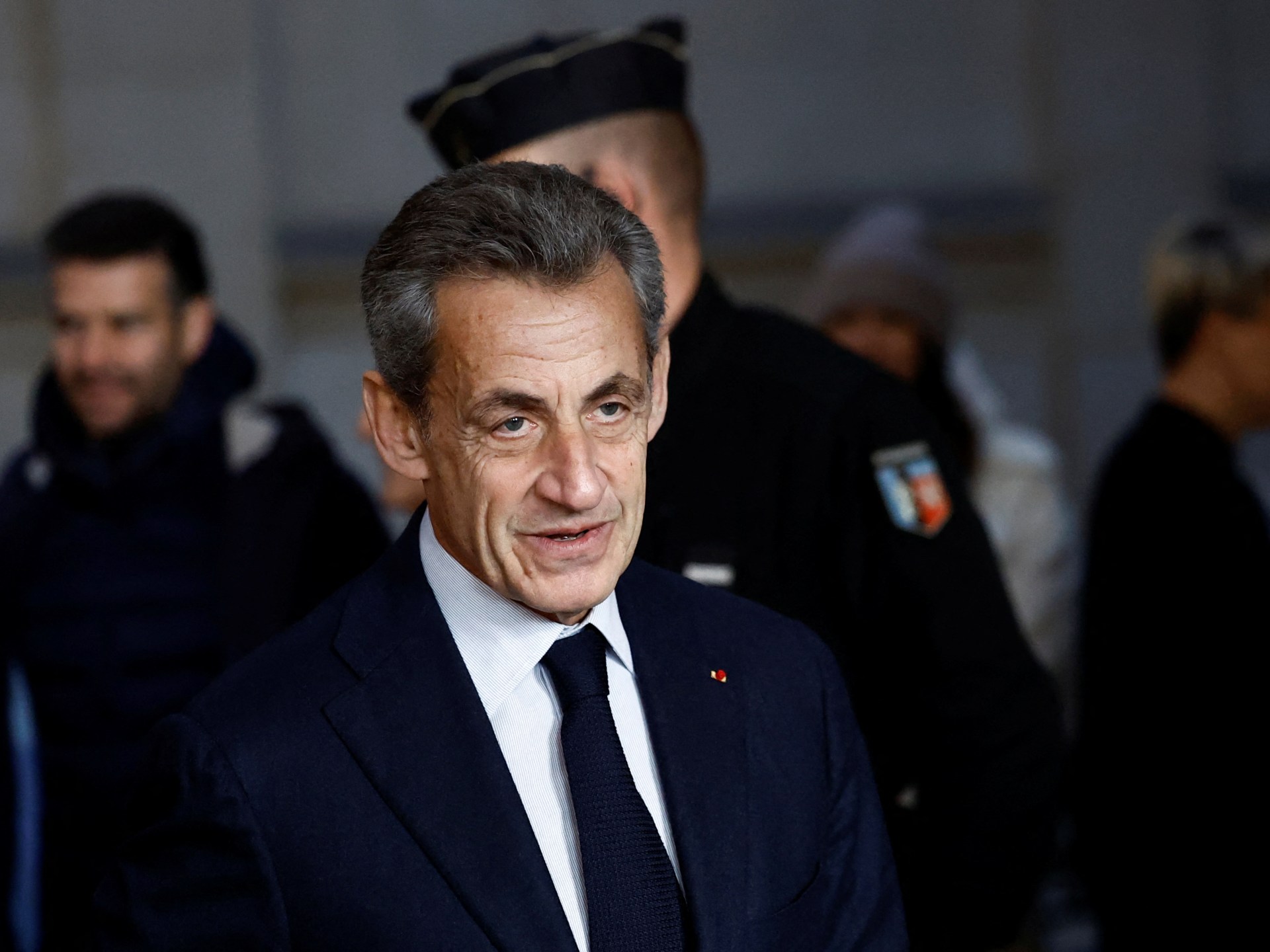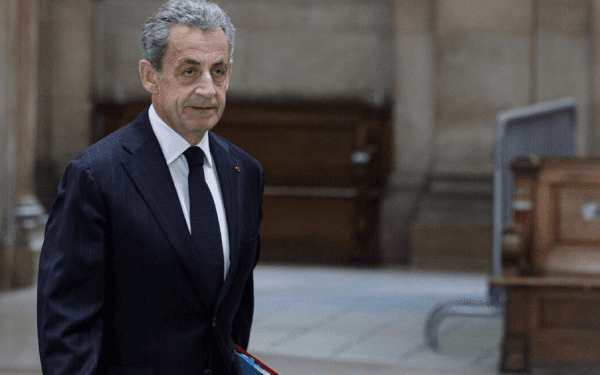Former President Nicolas Sarkozy’s corruption conviction was maintained by France’s highest court, which rejected his appeal.
The Court of Cassation’s decision on Wednesday requires Sarkozy, who was president from 2007 to 2012, to wear an electronic monitoring bracelet for a year.
Sarkozy, 69, responded by stating that he would not accept “the profound injustice” and will now fight the verdict before the European Court of Human Rights.

He was originally sentenced to three years in imprisonment in 2021, but two of them were suspended, and the third was converted to electronic monitoring rather than incarceration.
Sarkozy was convicted of attempting to bribe a judge in 2014, after leaving office, by offering him a prominent job in exchange for information concerning a different case.
In the 2021 verdict, Judge Christine Mée stated that the conservative lawmaker “knew what [he] was doing was wrong” and that his actions and those of his lawyer had given the public “a very bad image of justice”.
The crimes were specified as influence-peddling and violation of professional secrecy.
Speaking after Wednesday’s verdict by the Cour de Cassation, Sarkozy’s lawyer, Patrice Spinosi, said his client would comply with the conviction terms.
Sarkozy has now exhausted all his legal options in France, and his planned appeal to the European Court of Human Rights will not delay the verdict from being carried out.
The 2021 conviction was a legal landmark for post-war France.
The only precedent was the trial of Sarkozy’s predecessor Jacques Chirac, who got a two-year suspended sentence in 2011 for having arranged bogus jobs at Paris city hall for allies when he was Paris mayor. Chirac died in 2019.
Former President Nicolas Sarkozy’s corruption conviction was maintained by France’s highest court, which rejected his appeal.
The Court of Cassation’s decision on Wednesday requires Sarkozy, who was president from 2007 to 2012, to wear an electronic monitoring bracelet for a year.
Sarkozy, 69, responded by stating that he would not accept “the profound injustice” and will now fight the verdict before the European Court of Human Rights.

He was originally sentenced to three years in imprisonment in 2021, but two of them were suspended, and the third was converted to electronic monitoring rather than incarceration.
Sarkozy was convicted of attempting to bribe a judge in 2014, after leaving office, by offering him a prominent job in exchange for information concerning a different case.
In the 2021 verdict, Judge Christine Mée stated that the conservative lawmaker “knew what [he] was doing was wrong” and that his actions and those of his lawyer had given the public “a very bad image of justice”.
The crimes were specified as influence-peddling and violation of professional secrecy.
Speaking after Wednesday’s verdict by the Cour de Cassation, Sarkozy’s lawyer, Patrice Spinosi, said his client would comply with the conviction terms.
Sarkozy has now exhausted all his legal options in France, and his planned appeal to the European Court of Human Rights will not delay the verdict from being carried out.
The 2021 conviction was a legal landmark for post-war France.
The only precedent was the trial of Sarkozy’s predecessor Jacques Chirac, who got a two-year suspended sentence in 2011 for having arranged bogus jobs at Paris city hall for allies when he was Paris mayor. Chirac died in 2019.
Former President Nicolas Sarkozy’s corruption conviction was maintained by France’s highest court, which rejected his appeal.
The Court of Cassation’s decision on Wednesday requires Sarkozy, who was president from 2007 to 2012, to wear an electronic monitoring bracelet for a year.
Sarkozy, 69, responded by stating that he would not accept “the profound injustice” and will now fight the verdict before the European Court of Human Rights.

He was originally sentenced to three years in imprisonment in 2021, but two of them were suspended, and the third was converted to electronic monitoring rather than incarceration.
Sarkozy was convicted of attempting to bribe a judge in 2014, after leaving office, by offering him a prominent job in exchange for information concerning a different case.
In the 2021 verdict, Judge Christine Mée stated that the conservative lawmaker “knew what [he] was doing was wrong” and that his actions and those of his lawyer had given the public “a very bad image of justice”.
The crimes were specified as influence-peddling and violation of professional secrecy.
Speaking after Wednesday’s verdict by the Cour de Cassation, Sarkozy’s lawyer, Patrice Spinosi, said his client would comply with the conviction terms.
Sarkozy has now exhausted all his legal options in France, and his planned appeal to the European Court of Human Rights will not delay the verdict from being carried out.
The 2021 conviction was a legal landmark for post-war France.
The only precedent was the trial of Sarkozy’s predecessor Jacques Chirac, who got a two-year suspended sentence in 2011 for having arranged bogus jobs at Paris city hall for allies when he was Paris mayor. Chirac died in 2019.
Former President Nicolas Sarkozy’s corruption conviction was maintained by France’s highest court, which rejected his appeal.
The Court of Cassation’s decision on Wednesday requires Sarkozy, who was president from 2007 to 2012, to wear an electronic monitoring bracelet for a year.
Sarkozy, 69, responded by stating that he would not accept “the profound injustice” and will now fight the verdict before the European Court of Human Rights.

He was originally sentenced to three years in imprisonment in 2021, but two of them were suspended, and the third was converted to electronic monitoring rather than incarceration.
Sarkozy was convicted of attempting to bribe a judge in 2014, after leaving office, by offering him a prominent job in exchange for information concerning a different case.
In the 2021 verdict, Judge Christine Mée stated that the conservative lawmaker “knew what [he] was doing was wrong” and that his actions and those of his lawyer had given the public “a very bad image of justice”.
The crimes were specified as influence-peddling and violation of professional secrecy.
Speaking after Wednesday’s verdict by the Cour de Cassation, Sarkozy’s lawyer, Patrice Spinosi, said his client would comply with the conviction terms.
Sarkozy has now exhausted all his legal options in France, and his planned appeal to the European Court of Human Rights will not delay the verdict from being carried out.
The 2021 conviction was a legal landmark for post-war France.
The only precedent was the trial of Sarkozy’s predecessor Jacques Chirac, who got a two-year suspended sentence in 2011 for having arranged bogus jobs at Paris city hall for allies when he was Paris mayor. Chirac died in 2019.
Former President Nicolas Sarkozy’s corruption conviction was maintained by France’s highest court, which rejected his appeal.
The Court of Cassation’s decision on Wednesday requires Sarkozy, who was president from 2007 to 2012, to wear an electronic monitoring bracelet for a year.
Sarkozy, 69, responded by stating that he would not accept “the profound injustice” and will now fight the verdict before the European Court of Human Rights.

He was originally sentenced to three years in imprisonment in 2021, but two of them were suspended, and the third was converted to electronic monitoring rather than incarceration.
Sarkozy was convicted of attempting to bribe a judge in 2014, after leaving office, by offering him a prominent job in exchange for information concerning a different case.
In the 2021 verdict, Judge Christine Mée stated that the conservative lawmaker “knew what [he] was doing was wrong” and that his actions and those of his lawyer had given the public “a very bad image of justice”.
The crimes were specified as influence-peddling and violation of professional secrecy.
Speaking after Wednesday’s verdict by the Cour de Cassation, Sarkozy’s lawyer, Patrice Spinosi, said his client would comply with the conviction terms.
Sarkozy has now exhausted all his legal options in France, and his planned appeal to the European Court of Human Rights will not delay the verdict from being carried out.
The 2021 conviction was a legal landmark for post-war France.
The only precedent was the trial of Sarkozy’s predecessor Jacques Chirac, who got a two-year suspended sentence in 2011 for having arranged bogus jobs at Paris city hall for allies when he was Paris mayor. Chirac died in 2019.
Former President Nicolas Sarkozy’s corruption conviction was maintained by France’s highest court, which rejected his appeal.
The Court of Cassation’s decision on Wednesday requires Sarkozy, who was president from 2007 to 2012, to wear an electronic monitoring bracelet for a year.
Sarkozy, 69, responded by stating that he would not accept “the profound injustice” and will now fight the verdict before the European Court of Human Rights.

He was originally sentenced to three years in imprisonment in 2021, but two of them were suspended, and the third was converted to electronic monitoring rather than incarceration.
Sarkozy was convicted of attempting to bribe a judge in 2014, after leaving office, by offering him a prominent job in exchange for information concerning a different case.
In the 2021 verdict, Judge Christine Mée stated that the conservative lawmaker “knew what [he] was doing was wrong” and that his actions and those of his lawyer had given the public “a very bad image of justice”.
The crimes were specified as influence-peddling and violation of professional secrecy.
Speaking after Wednesday’s verdict by the Cour de Cassation, Sarkozy’s lawyer, Patrice Spinosi, said his client would comply with the conviction terms.
Sarkozy has now exhausted all his legal options in France, and his planned appeal to the European Court of Human Rights will not delay the verdict from being carried out.
The 2021 conviction was a legal landmark for post-war France.
The only precedent was the trial of Sarkozy’s predecessor Jacques Chirac, who got a two-year suspended sentence in 2011 for having arranged bogus jobs at Paris city hall for allies when he was Paris mayor. Chirac died in 2019.
Former President Nicolas Sarkozy’s corruption conviction was maintained by France’s highest court, which rejected his appeal.
The Court of Cassation’s decision on Wednesday requires Sarkozy, who was president from 2007 to 2012, to wear an electronic monitoring bracelet for a year.
Sarkozy, 69, responded by stating that he would not accept “the profound injustice” and will now fight the verdict before the European Court of Human Rights.

He was originally sentenced to three years in imprisonment in 2021, but two of them were suspended, and the third was converted to electronic monitoring rather than incarceration.
Sarkozy was convicted of attempting to bribe a judge in 2014, after leaving office, by offering him a prominent job in exchange for information concerning a different case.
In the 2021 verdict, Judge Christine Mée stated that the conservative lawmaker “knew what [he] was doing was wrong” and that his actions and those of his lawyer had given the public “a very bad image of justice”.
The crimes were specified as influence-peddling and violation of professional secrecy.
Speaking after Wednesday’s verdict by the Cour de Cassation, Sarkozy’s lawyer, Patrice Spinosi, said his client would comply with the conviction terms.
Sarkozy has now exhausted all his legal options in France, and his planned appeal to the European Court of Human Rights will not delay the verdict from being carried out.
The 2021 conviction was a legal landmark for post-war France.
The only precedent was the trial of Sarkozy’s predecessor Jacques Chirac, who got a two-year suspended sentence in 2011 for having arranged bogus jobs at Paris city hall for allies when he was Paris mayor. Chirac died in 2019.
Former President Nicolas Sarkozy’s corruption conviction was maintained by France’s highest court, which rejected his appeal.
The Court of Cassation’s decision on Wednesday requires Sarkozy, who was president from 2007 to 2012, to wear an electronic monitoring bracelet for a year.
Sarkozy, 69, responded by stating that he would not accept “the profound injustice” and will now fight the verdict before the European Court of Human Rights.

He was originally sentenced to three years in imprisonment in 2021, but two of them were suspended, and the third was converted to electronic monitoring rather than incarceration.
Sarkozy was convicted of attempting to bribe a judge in 2014, after leaving office, by offering him a prominent job in exchange for information concerning a different case.
In the 2021 verdict, Judge Christine Mée stated that the conservative lawmaker “knew what [he] was doing was wrong” and that his actions and those of his lawyer had given the public “a very bad image of justice”.
The crimes were specified as influence-peddling and violation of professional secrecy.
Speaking after Wednesday’s verdict by the Cour de Cassation, Sarkozy’s lawyer, Patrice Spinosi, said his client would comply with the conviction terms.
Sarkozy has now exhausted all his legal options in France, and his planned appeal to the European Court of Human Rights will not delay the verdict from being carried out.
The 2021 conviction was a legal landmark for post-war France.
The only precedent was the trial of Sarkozy’s predecessor Jacques Chirac, who got a two-year suspended sentence in 2011 for having arranged bogus jobs at Paris city hall for allies when he was Paris mayor. Chirac died in 2019.














